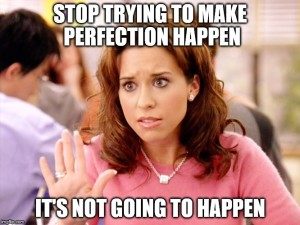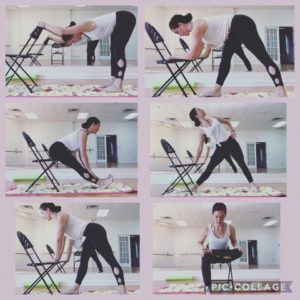The Pros & Cons of Comparing Yourself to Others
In Fitness (& Life)
PRO – Inspiration
When I first started taking fitness classes I found a friend in the crowd of benches and bars. We were about the same age and body type. She had been going to the class for at least a year. I was in awe of her and how much she could lift and it excited and inspired me to think maybe I could get there too. I would set up next to her every class I could, even though I was a little embarrassed by my baby-weights! Eventually, I was able to lift the same weight as her. It felt like an amazing accomplishment! Thinking back now, maybe if I had just sat in the back, self-absorbed and not paying attention to anyone else, I would not have gotten as strong as I did.
You can do more than you think you can (especially my ladies out there!) There have been several instances while training in the gym that a woman with my similar size and build will pick up a weight, and I’m like, “whaaaaaaaat??” Then, of course, I’m like, I gotta try that for myself! If she can do it, I can too! Women especially tend to underestimate their strength, or they are afraid if they lift too heavy they’ll “bulk up” (A MYTH.)
PRO – Motivation
If your working out next to someone at the gym, you’re more likely to take less brakes and work a little harder than if you were alone. You may not be doing it on purpose, but let’s be honest, we don’t workout in a vacuum! We are social creatures.

Research shows that working out with a buddy can increase your chances of accomplishing your fitness goals. If you look over and see your fitness-friend working harder than you, chances are you’ll up your intensity to match. This kind of “friendly competition” can be very effective in improving fitness of all kinds. Comparing your effort to their effort can help you work harder. The opposite is also true, so be careful to choose the right buddy! If they keep skipping out on your workouts, that means you’re more likely to play hooky too.
PRO – Innovation
I’ve gotten a boatload of new exercise ideas for myself and for my clients by comparing my programming with the programming of other trainers. Paying attention to what other fitness pros are up to is a great way to add to your programming toolbox, whether you’re a trainer or a fitness enthusiast. I love that I can go on Instagram and find at least 5 new exercise ideas I could never dream of on my own. There are new twists on classic moves, innovative utilization of everyday objects, and more! There’s also a million ways to break your own (or worse, your client’s) neck, so take it with a block of salt.
enthusiast. I love that I can go on Instagram and find at least 5 new exercise ideas I could never dream of on my own. There are new twists on classic moves, innovative utilization of everyday objects, and more! There’s also a million ways to break your own (or worse, your client’s) neck, so take it with a block of salt.
CON – Minimizing Your Own Accomplishments
These are all examples of personal goals I’ve achieved in the last 2 years:
- Got my 200 hour yoga teacher training certification
- Started a business
Yay me, right?? Well, I spend about 5 minutes feeling accomplished and proud of myself, THEN I think about that person I know that is just beyond where I’m at and the comparing begins… they’ve lost 20 lbs, their business is actually making money, they received their 500 hour YTT certification and are able to do a handstand in their sleep. Oof, gut punch to the ego. Suddenly my accomplishments seem insignificant. I begin to day dream about bigger and better goals I will conquer, thinking, once these are accomplished, then I’ll be happy.
Humility and modesty are good traits. That doesn’t mean you can’t feel proud of yourself, accept compliments on your achievements, and give yourself a relaxing buffer between one goal and the next. Pause after you’ve accomplished something instead of rushing off to get the next thing done. Even little things like cleaning your living room; take a moment, look around, acknowledge your fine work and take a deeeeeeep breath. Then move on, because that litter box isn’t going to clean itself!
 Most of you probably don’t know this about me, but my nickname is “Deflectra,” which is a combination of Electra (my middle name) and “deflecting.” I got this nickname because whenever anyone acknowledges one of my achievements, I make excuses for why it’s really not a big deal, and mention people that have done way harder things, or I change the subject completely. I AM WORKING ON THIS!
Most of you probably don’t know this about me, but my nickname is “Deflectra,” which is a combination of Electra (my middle name) and “deflecting.” I got this nickname because whenever anyone acknowledges one of my achievements, I make excuses for why it’s really not a big deal, and mention people that have done way harder things, or I change the subject completely. I AM WORKING ON THIS!
CON – Losing Sight of Your Own Path
Coveting what others possess (or what you think they possess) can turn dark and cause you to follow a path that is not authentically yours. This is especially true in the social media age, where Photoshop and filters run rampant. 99% of it IS NOT REAL. Kendall Jenner herself admits to taking HUNDREDS of selfies  before picking just one to post (after heavily editing.) Don’t chase that dragon.
before picking just one to post (after heavily editing.) Don’t chase that dragon.
If you’re on the right path, you will feel little to no cognitive dissonance, your actions and words will align with your core values. The seas will not always be smooth, but you will feel the current moving you in the right direction (and also bashing you into some rocks along the way.)
Also, remember to always check your motives. The motivation driving you to accomplish the thing is more important than the thing itself.
CON – Not Giving Something a Try
As a club manager and group fitness instructor, one of the things I’ve heard over and over from members is, “That class looks like so much fun! But all of the people in there are so fit, I couldn’t keep up.” This is what I tell them, and the people that come to the classes that I teach:

↠ “You don’t have to keep up with anyone but yourself.”
↠ “It’s you against YOU, not you against the person next to you.”
↠ This one I say in my yoga classes often: “The only reason your pose should look exactly like the persons’ next to you is if you’re looking into a mirror.”
↠ “You are in control, you can always just walk right out the door!”
Another piece of advice – ask for help. Don’t be shy, you’re freaking paying to be there! If something hurts or just doesn’t feel right, a good instructor will be able to give you options to modify the exercise and ensure you’re performing the move correctly. Depending on the class, you may have to wait till afterwards, but believe me, this is part of their job, and you should NEVER feel hesitant to ask for help or for more information. They work for you!
Let me know what you think about this in the comments below!
Thanks for reading!
– Jus

 Here is why practicing gratitude is important. This Harvard Health Publishing article explains that thinking about and expressing what we are grateful for increases our own sense of well-being and can improve the moods of those around us. Further more, if you are stuck in a negative thought cycle, taking a moment to meditate on what you are grateful for in your life can give you the space your mind needs to get on a different track. You don’t even have to write it down; just stop, close your eyes, ask yourself the question, “what am I grateful for?” And think about that person or thing for a few moments. THAT’S IT. It can be totally private, and certainly does not need to be broadcasted over the internet (i.e. #Blessed) to make it legitimate and effective.
Here is why practicing gratitude is important. This Harvard Health Publishing article explains that thinking about and expressing what we are grateful for increases our own sense of well-being and can improve the moods of those around us. Further more, if you are stuck in a negative thought cycle, taking a moment to meditate on what you are grateful for in your life can give you the space your mind needs to get on a different track. You don’t even have to write it down; just stop, close your eyes, ask yourself the question, “what am I grateful for?” And think about that person or thing for a few moments. THAT’S IT. It can be totally private, and certainly does not need to be broadcasted over the internet (i.e. #Blessed) to make it legitimate and effective. Well you knew this was coming at some point! This article from the American Psychological Association explains that exercise can help alleviate depression in the short term AND long term. You can do an experiment all by yourself… after a stressful day, go for a brisk 20 minutes walk, do you feel better or worse after your walk? I rest my case.
Well you knew this was coming at some point! This article from the American Psychological Association explains that exercise can help alleviate depression in the short term AND long term. You can do an experiment all by yourself… after a stressful day, go for a brisk 20 minutes walk, do you feel better or worse after your walk? I rest my case. Beware of perfectionism, it runs rampant this time of year. Slow down, take a big breath, open your eyes and check who’s driving the bus. Is it Pammy the Perfectionist or Down-to-Earth Debbie ? Pammy will drive you over a cliff, Pammy didn’t even pass her drivers exam… BEWARE OF PAMMY.
Beware of perfectionism, it runs rampant this time of year. Slow down, take a big breath, open your eyes and check who’s driving the bus. Is it Pammy the Perfectionist or Down-to-Earth Debbie ? Pammy will drive you over a cliff, Pammy didn’t even pass her drivers exam… BEWARE OF PAMMY.




 Have any of these fears ever manifested in real life? In my experience, no, never. My initial gut reaction is to suffer in silence. But the cool thing about being a human is we have CHOICES. It seems obvious, but how many time has your brain been hijacked by a childlike self that steers you right over a goddam cliff? For me, like 50 times. Putting my fears on display is super uncomfortable, but that’s how I know its productive. Changing behavior is all about practice, so the more I practice vulnerability, the easier it will become.
Have any of these fears ever manifested in real life? In my experience, no, never. My initial gut reaction is to suffer in silence. But the cool thing about being a human is we have CHOICES. It seems obvious, but how many time has your brain been hijacked by a childlike self that steers you right over a goddam cliff? For me, like 50 times. Putting my fears on display is super uncomfortable, but that’s how I know its productive. Changing behavior is all about practice, so the more I practice vulnerability, the easier it will become.







 Growing up, we were taken along to wherever our parents went. We were expected to behave and amuse ourselves with whatever was around. The world was not designed for children, and mom wasn’t going to make it seem so. Quitting, getting my own way, or being the center of the universe, was generally not a thing in my childhood. We were bored A LOT. But enduring boredom is also a skill, a long lost art, in fact. What child sits alone with their thoughts nowadays..?.. or adult for that matter? My imagination was glorious. When driving in the car I would visualize a horse outside my window in full gallop, jumping over everything in its path; signs, bridges, rivers… I am so happy I didn’t have an iPad.
Growing up, we were taken along to wherever our parents went. We were expected to behave and amuse ourselves with whatever was around. The world was not designed for children, and mom wasn’t going to make it seem so. Quitting, getting my own way, or being the center of the universe, was generally not a thing in my childhood. We were bored A LOT. But enduring boredom is also a skill, a long lost art, in fact. What child sits alone with their thoughts nowadays..?.. or adult for that matter? My imagination was glorious. When driving in the car I would visualize a horse outside my window in full gallop, jumping over everything in its path; signs, bridges, rivers… I am so happy I didn’t have an iPad.  I truly appreciate that my mother let me experience discomfort and didn’t try to pour sugar all over everything if things went sour. I remember falling from my horse and crying “It hurts!” And she
I truly appreciate that my mother let me experience discomfort and didn’t try to pour sugar all over everything if things went sour. I remember falling from my horse and crying “It hurts!” And she


 enthusiast
enthusiast
 Most of you probably don’t know this about me, but my nickname is “Deflectra,” which is a combination of Electra (my middle name) and “deflecting.” I got this nickname because whenever anyone acknowledges one of my achievements, I make excuses for why it’s really not a big deal, and mention people that have done way harder things, or I change the subject completely. I AM WORKING ON THIS!
Most of you probably don’t know this about me, but my nickname is “Deflectra,” which is a combination of Electra (my middle name) and “deflecting.” I got this nickname because whenever anyone acknowledges one of my achievements, I make excuses for why it’s really not a big deal, and mention people that have done way harder things, or I change the subject completely. I AM WORKING ON THIS!  before picking just one to post (after heavily editing.) Don’t chase that dragon.
before picking just one to post (after heavily editing.) Don’t chase that dragon. 



